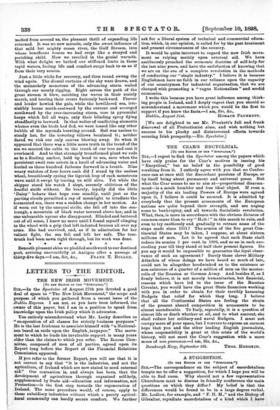LETTERS TO THE EDITOR.
THE NEW IRISH MOVEMENT.
[To THE EDITOR OF THE "SPECTATOR."] SIR,—In the Spectator of August 27th you devoted a good deal of space to "The New Irish Movement," the scope and purpose of which you gathered from a recent issue of the Dublin Express. I am not, as you have been informed, the owner of this paper, but I am in a position to speak from knowledge upon the Irish policy which it advocates.
You entirely misunderstand what Mr. Lecky describes as "co-operation of all classes for strictly business purposes." He is the last Irishman to associate himself with "a National- ism based on raids upon the English *taxpayer." The move- ment to which he lends his invaluable support is many years older than the claims to which you refer. The Recess Com- mittee, composed of men of all parties, agreed upon its Report long before the Report of the Financial Relations Commission appeared.
If you refer to the former Report, you will see that it is not correct to say that "it is the industries, and not the agriculture, of Ireland which are now stated to need external aid." Our contention is, and always has been, that the development of agriculture through organised self-help, supplemented by State aid—education and information, not Protection—is the first step towards the regeneration of Ireland. The same procedure would, of course, apply to those subsidiary industries without which a purely agricul- tural community can hardly secure comfort. We further ask for a liberal system of technical and commercial educa- tion, which, in our opinion, is called for by the past treatment and present circumstances of the country.
It would be quite incorrect to regard the new Irish move- ment as relying mainly upon external aid. We have assiduously preached the economic doctrine of self-help for the last nine years, and have the satisfaction of knowing that we are on the eve of a complete revolution in the methoda of conducting our "single industry." I believe it is because Englishmen have no faith in our reliance upon the capacity of our countrymen for industrial organisation, that we are charged with promoting a "vague Nationalism" and sordid economics.
I write this because you have great influent* among think- ing people in Ireland, and I deeply regret that you should so misunderstand a movement which you would be the first to support if you knew the facts.—I am, Sir, de.,
[We are delighted to see Mr. Plunkett's full and frank disavowal of all Protectionist aims, and wish nothing but success to his plucky and disinterested efforts towards. securing Irish prosperity.—En. Spectator.]


































 Previous page
Previous page